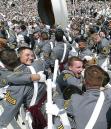|
 |
| |||||||||||||
|
|
| Top Stories - AP |
|
| Top Stories | AP | Reuters | The New York Times | USA TODAY | NPR |
Sat Jun 1, 3:48 PM ET By SCOTT LINDLAW, Associated Press Writer WEST POINT, N.Y. (AP) - The United States will strike pre-emptively against suspected terrorists if necessary to deter attacks on Americans, President Bush (news - web sites) told West Point graduates Saturday. "The war on terror will not be won on the defensive," he said.
Bush heard doubts from some Europeans last week about a possible expansion in the war on terror, but he sounded firm Saturday in his belief that a widening may be needed. He chose a receptive audience in the 25,000 people at West Point's Michie Stadium, among them 958 members of the U.S. Military Academy's class of 2002 — future leaders of the Army — who applauded throughout his speech. "This government and the American people are on watch. We are ready, because we know the terrorists have more money and more men and more plans," Bush said. "The gravest danger to freedom lies at the perilous crossroads of radicalism and technology," Bush said. "When the spread of chemical and biological and nuclear weapons, along with ballistic missile technology, when that occurs, even weak states and small groups could attain a catastrophic power to strike at great nations." Bush did not mention the nations he has identified as an "axis of evil" — Iraq, Iran and North Korea (news - web sites). Aides said his message, with references to "unbalanced dictators with weapons of mass destruction," was aimed at those states and any others that might sponsor or harbor terrorists. The president had not previously advised Americans "to be ready for pre-emptive action, when necessary, to defend our liberty and to defend our lives." Aides said that was a newly articulated component of his policy. Bush said the nation cannot afford to "put our faith in the word of tyrants who solemnly sign nonproliferation treaties and then systematically break them." The administration says Iran, Iraq and North Korea are out of compliance with such treaties. "All nations that decide for aggression and terror will pay a price. We will not leave the safety of America and the peace of the planet at the mercy of a few mad terrorists and tyrants," he said. The president also framed the war on terrorism as one that could bring a historic shift in international relations, from violent competition among the "great powers" to cooperation in fighting a shared enemy. "More and more, civilized nations find ourselves on the same side, united by common dangers of terrorist violence and chaos," he said. In the wide-ranging, 53-minute speech, Bush took on a host of international responsibilities alongside combating terrorism: fighting global poverty and promoting democracy, human rights and healthier economies overseas. Bush called for "moderation and tolerance" in other nations, though aides said the reference was to no country in particular. Some of America's military and economic allies, such as Saudi Arabia, are strict religious regimes. The crowd roared when graduates threw their white caps into a cloudless sky at the end of the ceremony. Bush congratulated the newest members of the "long gray line" as they collected their diplomas. As he did at Yale University's commencement last year, Bush poked fun at his own spotty academic career. He provoked a cheer when he cited former President Ulysses S. Grant, "who had his fair share of demerits and said the happiest day of his life 'was the day I left West Point.'" "During my college years, I guess you could say I was a Grant man," Bush said. In his weekly radio address, broadcast after the commencement address, Bush said West Point graduates will "provide the ultimate service to our nation as we fight and win the war on terror" — putting themselves on the line willingly so that other Americans can live in freedom. "Americans serve others because their conscience demands it, because their faith teaches it, because they are grateful to their country and because service brings rewards much deeper than material success," Bush said. "Government does not create this idealism, but we can do a better job of supporting and encouraging an ethic of service in America." Bush also will discuss volunteerism and other ways to serve the country beyond the military when he delivers the commencement address June 14 at Ohio State University.
|
| |||||||||||||||||||||||||||||||||||||||||||||||||||||||||||||||||||||||||||||||||||||||||||||||||||||||||||
| News Search |
Copyright © 2002 The Associated
Press. All rights reserved. The information contained in the AP News
report may not be published, broadcast, rewritten or redistributed without
the prior written authority of The Associated Press.
|


